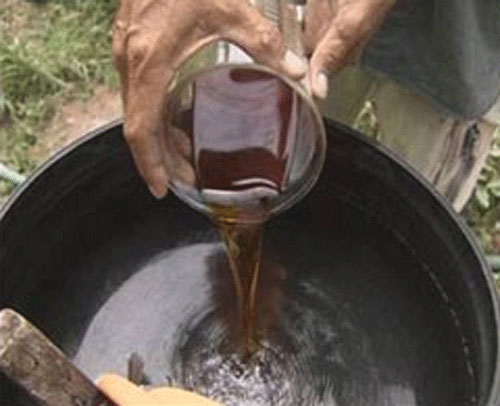
There are many claims on the benefits of Wood Vinegar for horticulture, agriculture, animal husbandry, and human use. But we are concentrating on benefits that we think will have the biggest impact on the future growth in food production while reducing dependence on finite chemicals used in horticulture.
When deciding on your trial parameters, we recommend considering the following points suggested by other users:
- Wood Vinegar can reduce the cluster value of water by a third, this means that the water is activated and it and any minerals included can be more easily absorbed by plants. This has the potential to reduce the use of agro-chemicals and synthetic fertilisers
- Adding vinegar to use as a penetrant to improve the uptake of other applications
- Used diluted as a stimulant for seed germination, it has shown improved strike rate and time for a variety of species
- It shows benefits to plant health at lower concentration rates but at higher concentrations can also show detrimental effects
- Wood Vinegar should always be used diluted and it’s strength will vary between foliar and soil application along with frequency of application
- At full strength it can be used as a herbicide, weed killer, due to the Acetic acid content
- Longer term regular use has shown of improved plant health and ability to naturally protect themselves from pests and disease
Advantages and Benefits of Wood Vinegar


When used as a Fertiliser:
- Improve absorption through the roots
- Stimulates plants and vegetable growth
- Strengthens roots and leaves
- Increases the quantity of useful microbes
- Increased soil microbial weight
- Used as penetrant for better uptake
- Increase crop resistance to adverse condition
- Improved tree health, darker green leaves for better photosynthesis, thicker and stronger stems, higher growth rates, naturally more resistant to disease
- Improves fruit quality and increases sugar content in fruit, and stimulate development of crops
- Improve flavor, color, firmness and preservation of fruit
- Works as flavor enhancer for agricultural end products
- Prevents excessive nitrogen levels, improves lant metabolism and contributes to higher fruit sugar levels
- Strengthen the photosynthesis
- Increases the content of chlorophyll of the plants
- Reduced fertiliser or other agrochemical volume used with better yields in viticulture and grain crops
- As a foliar spray it can allow better uptake and a reduction in the use of other fertilizers, herbicides and pesticides
When used as a Pesticide
- Repel pests, prevent plant infection from fungal, bacterial and virus-like disease
- Inhibits virus and soil disease when mixed in high concentration
- Repels insects on plants (or deodorizer)
- Prevents diseases caused by bacteria
- Reduce odor by diminishing the production of odor-causing ammonia in animal pens
- Repels houseflies when diluted and applied to affected areas
- Repels nematodes when diluted and applied to the base of plants
- Corn preservative
- Control of fungal diseases when used as a foliar spray
- Control of root rot when diluted and applied to the base of plants
- Reduce incidence of chili pepper flowers aborting
When used to to Enrich Soil

- Enriches soil fertility when diluted with water and sprayed onto the soil before planting
- Enrich garden soil by applying prior to planting crops
- By applying a stronger mix it can help control soil-based plant pathogens
Other Advantages and Benefits of Wood Vinegar
- Facilitating compost. There is a growing number of farmers and commercial soil compost producers looking for ways to improve their composting processes while reducing costs and improving the end product. By applying diluted solution onto composting materials, it will help increase the biological activity of various beneficial microbes and can decrease composting times.
- Seed Germination. Our vinegar nourishes seeds for germination and improved seed germination strike rate. Just soak seeds in dilute solution for seeds for 24 hours before sowing.
